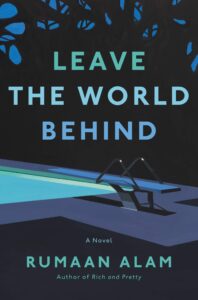I’ve read Leave the World Behind three times and each time I love it more. It took me a while to get used to its voice–sardonic and even a little bit mean, as well as being outrageously, unapologetically omniscient. It’s a voice that I’ve more or less been schooled to distrust in this postmodern world. Once I tuned myself to this novel’s unique rhythms, though, both the story and the storytelling became explosively alive for me.
I needed to learn how to read this novel. I needed to overcome my natural likes and dislikes to fully appreciate its genius. For example, one thing I typically don’t have patience for in novels is long lists of stuff. Authors seem to like lists a lot but usually they seem kind of lazy and unnecessary to me. Alam uses this technique to perfection in chapter 3, though, when he lists all the things Amanda puts in her grocery cart. It shouldn’t be riveting, but it is. Each item Amanda chooses off the shelves gives me one more angle to view her character, and by the end I understand her limitations, and her self-image, and the ways she feels most vulnerable. All from a bunch of food items. It’s extraordinary writing.
My favorite novel published in 2020. It won me over. It snuck up on me.
Note with spoilers 2/16: (view spoiler)[I’m diving in for a fourth time, honestly, I’m fascinated by this novel and how it works. This time I’m listening to the audiobook. The narrator is really good.
It’s a very complex book in terms of craft. At first it’s written in a way that you assume it’s one of those big social novels like The Corrections, and then it morphs into something more stark, some kind of an examination of privilege and race and prejudice…and then there are a series of ever-more-horrific encounters, all of which never spill over into the expected violence, AND THEN it leaps into a seriously gorgeous meditation on what-might-be-next if and when the rarified world we live in collapses.
I don’t say “gorgeous” too often about novels and the way they’re written. The flamingos in the pool. The deer moving in huge herds. Rose in the woods, and the little fire of hope the author puts out there for us readers, when he assures us that she’ll survive. And that through her something meaningful will survive.
